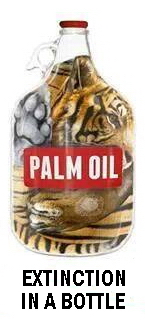 Say no to palm oil!
Say no to palm oil!
Did you know that most of us are unwittingly financing one of the world’s biggest ecological disasters and acts of primate genocide in history?
Borneo and Sumatra are two of the most bio-diverse regions of the world, yet they have the longest list of endangered species. This list includes the magnificent orangutan.
These two South-East Asian islands are extremely rich in life, containing around 20,000 flowering plant species, 3,000 tree species, 300,000 animal species and thousands more are discovered each year.



Despite having an amazing biodiversity and delicate web of species, with many species and sub-species yet to be discovered, an area the size of 300 football fields of rainforest is cleared each hour in Indonesia and Malaysia to make way for the production of vegetable oil. That’s six football fields destroyed each minute.
This vegetable oil is called palm oil, and is found in hundreds of the everyday products, from baked goods and confectionery, to cosmetics and cleaning agents… many of which you buy in your weekly shopping.





























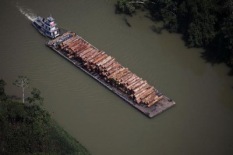















Due to the massive international demand for palm oil, palm oil plantations are rapidly replacing the rainforest habitat of the critically endangered orangutan; with over 90% of their habitat already destroyed in the last 20 years.
Orangutans are some of our closest relatives, sharing approximately 97% of their DNA with humans. Orangutan means ‘person of the jungle’ in the Indonesian language. It is estimated that 6 to 12 of these ‘jungle people’ are killed each day for palm oil.
These gentle creatures are either killed in the deforestation process, when they wonder into a palm oil plantation looking for food, or in the illegal pet trade after they have been captured and kept as pets in extremely poor conditions and provided with extremely poor nutrition.
Orangutans are considered as pests by the palm oil industry. In the deforestation process, workers are told that if wildlife gets in the way, they are to do whatever is necessary in order to dispose them, no matter how inhumane. Often orangutans are run over by logging machinery, beat to death, buried alive or set on fire… all in the name of palm oil.
Rich Zimmerman, Executive Director of Orangutan Outreach has accompanied a few rescue missions in Borneo but his work is mainly in New York and online—advocating on behalf of orangutans, promoting the cause and communicating the critical need to help them before it’s too late.
Fascinating facts about orangutans
“What inspired you to work with orangutans?”
“I’ve loved orangutans since I was a child. I went in a different direction professionally and it was only later in life—when I realized just how perilously close the orangutans were to extinction in the wild—that I decided I needed to do something to help them.
After traveling to Indonesia and seeing the utter devastation to their forests and the rescue center cages full of hundreds of orphaned and displaced orangutans staring out with such sadness and desperation in their eyes, I decided to dedicate my life to helping them. I created Orangutan Outreach in 2007 as a way to raise awareness of the crisis facing wild orangutans and to raise funds for the rescue projects in Borneo and Sumatra.”
“Can you tell us a brief story about an individual orangutan that was personally affected by human encroachment?”
“Every orangutan in every rescue center has been affected by human encroachment. Whenever there is a conflict, the human always wins. Orangutans—and elephants, rhinos, tigers, monkey, you name it—always fall victim to the constant expansion of human settlement and the destruction of their habitat by logging, palm oil, and mining companies. Every baby in a rescue center was torn off his or her dying mother.
“These innocent babies are traumatized—just as any human baby would be if pulled from its mother. And for each infant confiscated and brought to a rehabilitation center, it is estimated that anywhere from four to nine did not survive.
Orangutans are seen as a pest in deforestation and thousands are murdered every year. It’s horrific what is being done to these creatures… for no fault of their own they are being wiped out of existence by humans”.
Orangutans stay with their mothers for five years, longer than any other mammal. The few that can be cared for in orphanages suffer terribly from the irreplaceable loss of their mother and their whole family.
This little one will have seen his home torn down along with the jungle around in a very brutal way. He almost certainly will have seen his mother murdered along with many other orangutans and other species. Many orangutans are eaten. There are people who like to eat their brains. The orangutans are also set alight and killed in other horrible ways.

































Government data has shown that over 50,000 orangutans have already died as a result of deforestation due to palm oil in the last two decades.
Experts say that if this pattern of destruction and exploitation continues, these intelligent acrobats of the jungle will be extinct in the wild within 2 to 12 years (as early as 2015).
It is also thought that their jungle habitat will be completely gone within 20 years, around 2033.



Around 50 million tons of palm oil is produced annually; with almost all of that being non-sustainable palm oil, that replaces 12 million hectares of dense, bio-diverse rainforest. That’s the equivalent landmass of North Korea deforested each year for palm oil alone!
Palm oil is having a shocking impact on our planet. The production of this one vegetable oil is not only responsible for polluting rivers and causing land erosion, but when the plantation workers set fire to the remaining trees, shrubs and debris to make way for the oil palms, it produces immense amount of smoke pollution that is toxic to planet earth. This has been found to be the second biggest contributor to greenhouse gas in the world.


By purchasing products that contain crude palm oil, you are helping destroy ancient, pristine rainforest, wipe out species like the orangutan, and create a large-scale ecological disaster. Think of the consequences next time you do your weekly shopping; the consequences not only for orangutans and other animals, but for us as the human race; for we cannot survive without the rainforests either. We have a choice, orangutans do not.




You can help end the cruelty by sharing the truth about animals’ abuse. If you agree that animals feel, suffer, love and the truth about their abuse should be exposed.In the UK about 40% of the food we buy contains palm oil.
Say no to deforestation and palm oil
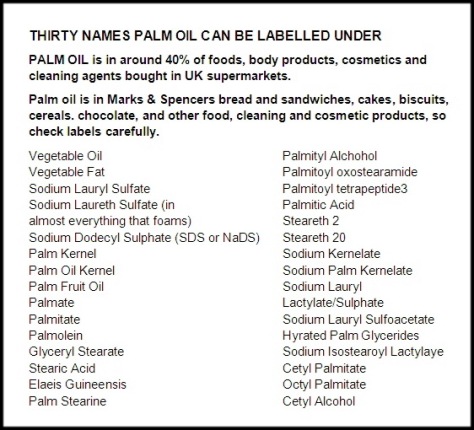














Already more than half of the 280 sub-species of monkeys, with an amazing variety of size and appearance, are endangered, mostly due to hunting and loss of habitat, especially due to deforestation..

























































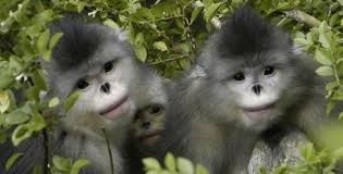





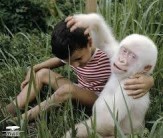



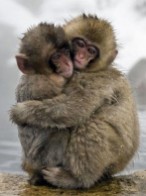
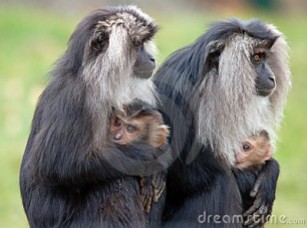








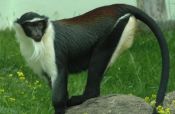










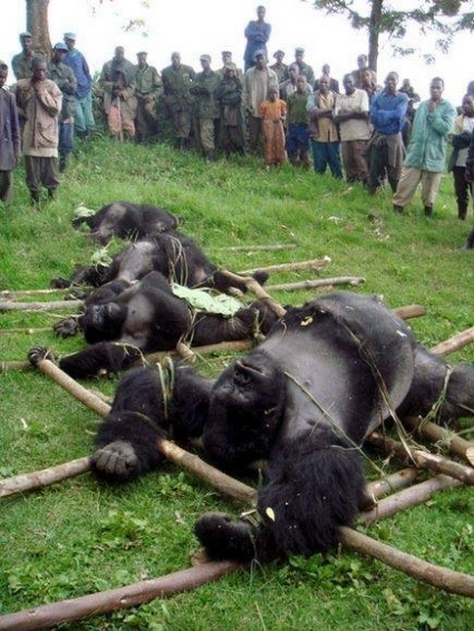

Slavery driving apes to extinction
http://www.news24.com/Green/News/Slavery-driving-apes-to-extinction-20140701
As primates along with other wildlife are made homeless – where are they supposed to go? The truth is that just as some people think nothing of killing our closest relatives in the animal kingdom who are ‘hunted’ and killed by people for fun, there are those who kill primates for food in something known as the “Bushmeat Crisis”.
What is the Bushmeat Crisis?
In Africa, forest is often referred to as ‘the bush’, thus wildlife and the meat derived from it is referred to as ‘bushmeat’ (in French – viande de brousse). This term applies to all wildlife species, including threatened and endangered, used for meat including gorilla, chimpanzee and other primates, elephant, forest antelope (duikers), crocodile, porcupine, bush pig, cane rat, pangolin, monitor lizard, guinea fowl, etc.
Though habitat loss is often cited as the primary threat to wildlife, commercial hunting for the meat of wild animals has become the most significant immediate threat to the future of wildlife in Africa and around the world; it has already resulted in widespread local extinctions in Asia and West Africa.
This threat to wildlife is a crisis because it is rapidly expanding to countries and species which were previously not at risk, largely due to an increase in commercial logging, with an infrastructure of roads and trucks that links forests and hunters to cities and consumers.
The bushmeat crisis is a human tragedy as well: the loss of wildlife threatens the livelihoods and food security of indigenous and rural populations most depend on wildlife as a staple or supplement to their diet, and bushmeat consumption is increasingly linked to deadly diseases like HIV/AIDS, Ebola, and Foot and Mouth disease.
“Bushmeat Crisis Taskforce” is most concerned with bushmeat that is illegally, commercially and/or unsustainably derived from wildlife, including that characterized by:
- Illegal methods of hunting (wire snares, unregistered guns);
- illegal species (endangered, threatened, or protected);
- taken from unauthorized areas; and
- unsustainable off-take for commercial trade or non-commercial uses.
It’s not only primates who suffer, all forms of wildlife suffer and die due to loss of habitat, killing and illegal trafficking. Usually the animals or birds are cramped far too close together and not given food or water for a long time, so many die in transit.








Illegal traffickers steal an estimated 40 million animals from Brazil’s forests each year, according to an annual report on animal trafficking in the country published earlier this year.
The report, produced by Brazil’s National Network Against the Trafficking of Wild Animals (RENCTAS), estimated that local traffickers of endangered animals earn about $1 billion a year, causing untold losses to the country’s natural habitat.
Flavia Morad, a RENCTAS biologist who helped produce the report, said the survey was the first that combines all data on animal trafficking in Brazil, a country with the largest number of animal and plant species in the world.
Apart from the Amazon, the world’s largest tropical forest, Brazil’s vast Pantanal wetlands are also home to countless animals and plants.
The report said that animal trafficking was the world’s third biggest cross-border criminal activity after arms and drugs smuggling, with annual global sales of up to $20 billion.
The survey, which includes detailed maps of traffickers’ routes for their live cargoes of everything from rare parrots to deadly snakes, said just 0.45 percent of the total amount of animals smuggled each year are intercepted by police.
“There is the domestic and the foreign market,” said Morad. ”The foreign market is mainly for rare species.”
Prices fetched abroad vary from $60,000 for a rare Lear’s Macaw parrot to $20,000 for a poisonous Jararaca snake. According to the report, a Jaguar skin can be bought for $20,000 in the United States.
Parrots and parakeets of all species can be bought throughout Brazil at town fairs and markets, usually taken illegally from their natural habitats. Birds sold locally fetch between $5 to $100, while rare breeds shipped abroad sell for much more.
Monkeys captured for laboratory experiments
Every year in the US alone, more than 125,000 primates are imprisoned in laboratories, where they are abused and killed in invasive, painful, and terrifying experiments. While it is well known that nonhuman primates are sensitive, intelligent beings who share many important biological and psychological characteristics with humans, these very attributes, unfortunately, make them prime targets for experimenters, who treat them as if they were disposable pieces of laboratory equipment.
The U.S. even holds the dishonorable distinction of being the only nation in the world, other than Gabon, that continues to conduct invasive experiments on chimpanzees.
Read more: http://www.peta.org/issues/animals-used-for-experimentation/primates-laboratories/#ixzz2y9Cm6o8Z





Primates are also under attack from trophy hunters who are primarily American, but also may be from Germany, Scandinavia or elsewhere, who travel the globe killing all types of animals for fun, like a game and a holiday in one. Usually they pose with the dead animal for a trophy picture and sometimes take the animals’ bodies home with them to be stuffed and put in a trophy room.














This picture was posted on the internet by one of the many companies who sell holidays for people to go and ‘hunt’ or more precisely kill primates – even apes, including chimpanzees, our closest relatives – for fun, in trophy hunting. This ought not to be legal, but it is.

|
|
|
|
|
|
|
|
The above video of a lyre bird is both amazing and damning as it can imitate any sound it hears and imitates perfectly the sound of cameras, chainsaws and other machinery.




Pledge to stop buying supermarket products that contain palm oil
Petition to force companies to state when they use palm oil
The last stand of the orangutan
Orangutans under threat the plan to win
Environmental Investigation Agency
https://www.facebook.com/environmentalinvestigationagency?fref=photo
New report on the damage wrought by plantations and mining in Aceh, Indonesia, released November 2014 from our friends at Rainforest Action Network …
The Last Place on Earth – The Leuser Ecosystem
At 6.5 million acres, the Leuser Ecosystem is a world unto itself—a rich and verdant expanse of intact tropical lowland rainforests, cloud draped mountains and steamy peatlands swamps. It is among the most biodiverse and ancient ecosystems ever documented by science, and it is the last place where Sumatran orangutans, elephants, tigers, rhinos and sun bears still roam side by side.
But the Leuser Ecosystem exists at a tenuous crossroads. Despite being protected under Indonesian national law, massive industrial development for palm oil, pulp and paper plantations and mining threaten the entire ecosystem, as well as the continued wellbeing of the millions of Acehnese people who depend on it for their food, water and livelihoods.
Will you raise your voice today to call for the protection of the Leuser Ecosystem?
We must convince Musim Mas Group to break its ties to the destruction of the Leuser Ecosystem. As the palm oil trader most at risk of trafficking Conflict Palm Oil sourced from the Leuser Ecosystem, Musim Mas Group must take action.
This palm oil giant must ensure that it is not sourcing, processing and shipping palm oil fruit grown inside the Leuser Ecosystem to its customers—including the Snack Food 20—around the globe.
At a time when the largest palm oil traders have committed to cut rainforest destruction and human rights abuses from global supply chains Musim Mas Group is delaying taking real action. This has to change and with your help it will.
Add your name. Raise your voice today to protect the Leuser Ecosystem.
Read the RAN report and take action athttp://www.ran.org/lastplaceonearth
#Indonesia #Aceh #forests #palmoil #mining#plantations
Palm oil products in most products bought at supermarkets
http://www.bbc.co.uk/panorama/hi/front_page/newsid_8517000/8517093.stm
Please note that most of the bread, cakes and biscuits, ready meals and even all the sandwiches at Marks and Spencer contain palm oil.



Reblogged this on Truth in Reality and commented:
Oftentimes Christians ought to care a great deal more about God’s creation than they do. As we were made in the image of God, surely then we ought to love and care for the environment and all the beautiful animals that God made with such an amazing variety. It is pride and arrogance to believe that we are so much better than animals when so often our behaviour is beyond appalling. God gave us the animals to love and care for, not to abuse and destroy. This world is their home too, and the only one they have.
“For God so loved the world, that he gave his only begotten Son, that whosoever believeth in him should not perish, but have everlasting life.” (John 3:16 AKJV)
Trophy-hunting Americans kill more than 800 monkeys each year